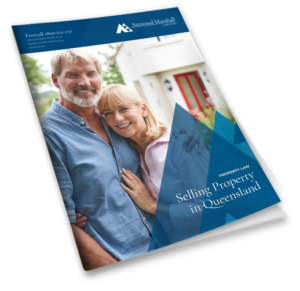Residential Conveyancing – Selling a Property in QLD
Property Law
Helping you ensure that your property sale goes smoothly and settles on time
Selling a residential property in Queensland can be an overwhelming and sometimes emotional experience. You might be selling your first home or acting as an executor for your mother’s estate. In any event, it is important to have a solicitor review the Contract before you sign to ensure the Contract reflects your best interests and to provide you with legal advice in relation to your rights, obligations and warranties.
Our experienced property lawyers can assist you with the start to finish process when selling residential property including houses, units, townhouses and vacant land.
If you are selling property as a foreign person/entity or as an Attorney under an Enduring Power of Attorney, you also need to meet certain requirements. In order to ensure you are meeting your requirements, contact our experienced property lawyers today. Our team will be able to provide you with clear and trusted advice and can help you understand your obligations.
Attwood Marshall Lawyers specialise in residential conveyancing on the Gold Coast, Brisbane and throughout Queensland. Our experienced property lawyers can assist you whether you are selling privately or through a real estate agent. We take great pride in providing trusted advice and exceptional service to ensure your transaction runs smoothly and there are no nasty surprises along the way.
Download an Info Pack
Provide your details below and our ‘Selling Property in Queensland’ Information Pack will be sent to your inbox.
FAQs
Certain legislation requires you to disclose information about the property you are selling including the following:
- Environmental Protection Act 1994 (Qld): if the land is recorded on the Environmental Management Register or the Contaminated Land Register, you must disclose that the particulars have been recorded in the register and, if the land is subject to a site management plan, the details of the plan;
- Electrical Safety Regulation 2013 (Qld): you must disclose whether a safety switch is installed in the property;
- Fire and Emergency Services Act (Qld): you must disclose whether there are compliant smoke alarms installed in the property;
- Queensland Building and Construction Commission Act 1991 (Qld): if any building works were carried out by an unlicensed builder and if the property is sold within six years of completion of the work, you must give notice detailing the work carried out along with the relevant warning under the legislation;
- Neighbourhood Disputes (Dividing Fences and Trees) Act 2011: you must disclose if there are any applications to, or orders made by QCAT in relation to trees affecting the property.
Selling a property though an agent involves a real estate agent, who represents the seller and will receive a commission from the seller when the property is sold. The real estate agent is responsible for marketing the property, obtaining the best price and drafting the standard contract of sale for the seller. A real estate agent is not qualified to give legal advice on the contract, draft clauses or modify the pre-printed contract in any way.
A private sale is an unadvertised sale of property which is not open to the general public. A private sale is negotiated between a buyer and a seller directly. Usually, there is no intervention by an agent in a private sale and the seller’s solicitor will prepare the draft Contract to provide to the buyer’s solicitor for review.
An auction is a public sale, usually conducted by an auctioneer or a qualified real estate agent and is governed by strict rules. It is advertised for a specific place, time and date and prospective buyers bid for the property with the property being sold to the highest bidder. If you sell your property via auction, there is no cooling off period, the successful bidder is legally obliged to buy the property.
If you are selling a property with a mortgage, you will need to arrange for the mortgage to be released on settlement. This involves completing and signing a formal release of mortgage form and providing it to your lender. The discharge process can take up to 3 weeks, so it’s important you arrange this with either your lender or solicitor as early as possible in the conveyance to not delay settlement.
Land tax is a state tax, calculated on the freehold land you own in Queensland at midnight on 30 June each year. The tax rate that applies depends on what type of owner you are, the total taxable value of your land, and if any exemptions apply. Generally, when you enter into a contract for the sale of land, the seller is liable to pay any land tax on the property prior to settlement. It will not matter if you do not own the land for the full financial year, liability is not usually divided between a buyer and seller.
It is the buyers responsibility to apply for a clearance certificate to make sure they are not charged land tax on land they are buying.
If you’re selling an existing lot in a community titles scheme, you must give a prospective buyer a signed disclosure statement before the buyer enters into the contract for sale. A disclosure statement will contain the information which needs to be disclosed to the prospective buyer including; the contact details for the body corporate manager, the amount of annual contributions payable by the owner of the lot, any improvements on common property which the buyer will be responsible for and the insurance details. If a disclosure statement has not been provided or has not been signed by the seller, before the buyer has entered into the contract, the buyer may have a right to terminate the contact.
In Queensland conveyancing, ‘time is of the essence’ is a contractual term in the standard Contract that requires a timely completion of a task. If a task is not completed on time by a party, then the other party to the Contract will have rights against the defaulting party. There can be serious consequences for sellers who fail to comply with their obligations. This may include termination of the Contract, forfeiting the deposit or claims for damages.
Meet our Property & Commercial team
Our Property Lawyers have the expertise to ensure clients receive reliable and up-to-date advice. We have the experience to assist buyers and sellers with residential purchases, investment properties, or off-the-plan contracts.

Jeff
Garrett


Taylah
Lein






